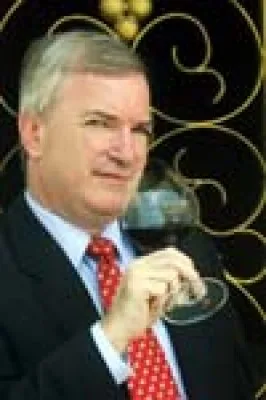As Israel celebrates Yom Hatzmaut Independence Day for the 60th time, I have been given the task to look back and select a wine to cover each decade. This is not necessarily meant to be a list of the best wine, but the one that best represented Israel at the time, particularly overseas.
1948 -1958
This is a difficult choice. The main brands that continue from pre-state until today are not wines but brandies: both Carmel Extra Fine Brandy and Stock 84 have survived the 60 years of statehood and are still on the shelves. However, if I had to choose a wine to be representative of the period from 1948 to 1958, it would have to be a sweet wine, which is what people then drank. Then there were wines sold by names which have since been protected, like Port, Sherry, Malaga & Tokay. A big seller representing Israel overseas at this time was Palwin (short for Palestine Wine) Israels oldest wine brand, but this was exclusively sold in Britain. So my choice would be Alicante, which was then a sweet red wine made by the Alicante Grenache variety.
1958 -1968
Adom Atik and Carmel Hock were produced by what was then known as Carmel Mizrahi. Hock was the biggest selling Israeli table wine in the 1960s. It was the semi dry wine Israelis used to drink as a spritzer adding soda water. Adom Atik, a red wine, was the biggest selling table wine in export markets, sometimes exporting surprising quantities to the non kosher market, in particular to Sweden. Well into the 1980s international wine books would still refer to Adom Atik when writing about Israel. Once these two wines symbolized Israeli wine. Today they are still sold to the older generation who became used to them over the years. The wine revolution has left them way behind, but historically they are of interest because they have been available throughout Israels 60 years.
1968 -1978
The wine of this decade was Carmel Special Reserve Cabernet Sauvignon 1976. This was Israels first serious varietal, aged in barrel & bottle like an quality international class wine. It was a wine that had a long life being drinkable, if well cellared, for up to 20 years. It was the first wine to picture Baron Edmond de Rothschild, the founder of the modern wine industry in Israel, on the label. It was also labeled as a varietal. In the coming years more and more Israeli wines would follow this new world trend. The biggest selling wine during this period was Grenache Rose as Israeli consumers started to move from sweet to semi dry wines. However it was the 1976 Special Reserve which heralded the great leap forward.
1978 – 1988
The award here goes to Yarden Cabernet Sauvignon 1984. The 1985 won more prizes and was arguably both a better quality and more long lasting wine, but the 1984 was the first Israeli wine to win a truly major international award. It won the Gold Medal at The International Wine and Spirit Competition in London in 1987. Furthermore it also was awarded the Winiarski Trophy for the best wine in the competition. This wine heralded the advance of the Golan Heights Winery, which brought the new world technological revolution to Israel, setting new standards for Israeli wine. It was the first wine Israel was mentioned overseas as a country capable of making world class wines.
1988 – 1998
The wine of the 1990s was the Castel Grand Vin 1992. This was the wine discovered by Serena Sutcliffe MW of Sothebys, who described it as the finest Israeli wine she had tasted. The success of Domaine du Castel heralded and encouraged the small winery boom and they were the first of the new wave boutique wineries to receive international recognition. There were other great wines like Margalit Special Reserve 2003, the Yarden Katzrin 1990, Israels first super de-luxe wine and Yarden Blanc de Blancs, a Trophy winner, but Castel built on the foundations to become Israels best known small winery. Incidentally, the largest selling wine of this period was Emerald Riesling, a semi dry wine which introduced many of Israels future connoisseurs to wine.
1998 – 2008
The wine of the last ten years would have to be Yatir Forest 2003. This was the red wine finishing in first place in the first tasting conducted by Robert Parkers Wine Advocate. Receiving 93 points would be regarded as a very respectable score for any winery. No other wine from the Eastern Mediterranean region had achieved this and it also equaled the best score ever awarded for a kosher wine by the Wine Advocate. Yatir was one of a number of new quality small wineries, which opened in the first years of the new century. The tasting was a watershed for Israeli wine desperate to shed its kosher image and to be regarded as a quality wine producing country in its own right. The most awarded wines of this period have been two dessert wines – the Yarden HeightsWine1999 and the Carmel Shaal Gewurztraminer 2004. The largest selling brands are Carmel Selected and Mount Hermon. There are many quality wines of every description, at every price point in the Israel of today. However Israels quality will best be judged abroad by its red wines and Israel has waited a long time for a tasting of this status by the most important and influential wine critic in the world. So Yatir Forest is the choice.
Israel has a winemaking history going back 5,000 years and a modern wine industry since Carmel was founded in the 1880s by Baron Edmond de Rothschild. However it is fair to say that the quality revolution has occurred only in the last 32 years. 1976 was not only the year of Carmels famous Special Reserve, but also the year vineyards were first planted on the Golan. It is heartwarming to see the massive strides made by Israeli wine since then.


